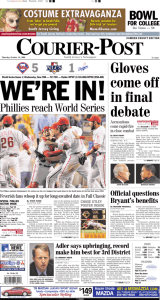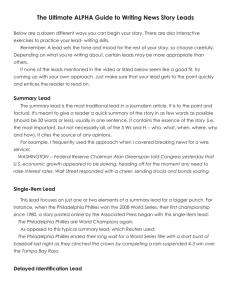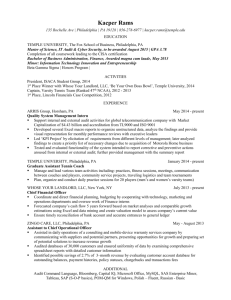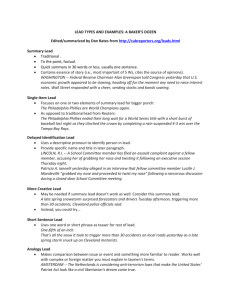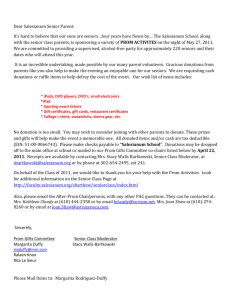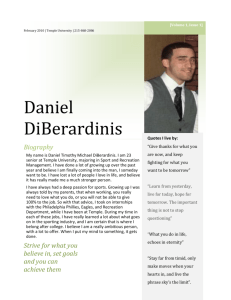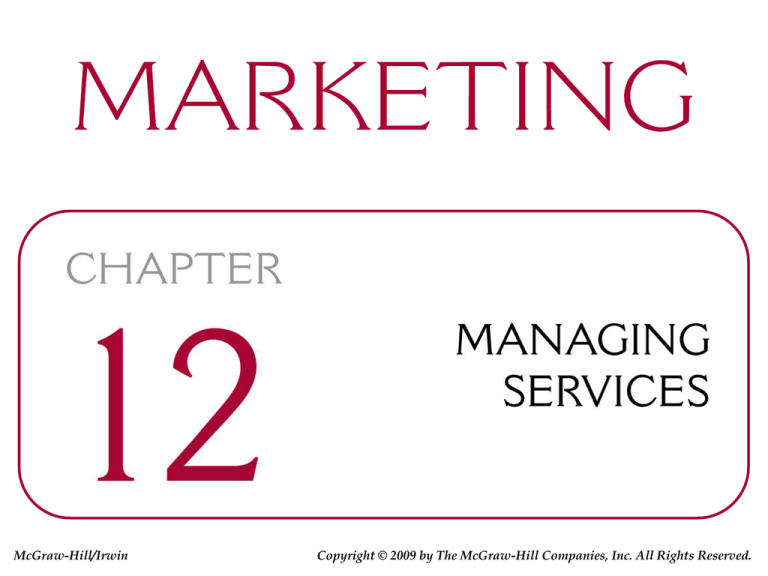
McGraw-Hill/Irwin
Copyright © 2009 by The McGraw-Hill Companies, Inc. All Rights Reserved.
LEARNING OBJECTIVES (LO)
AFTER READING CHAPTER 12, YOU SHOULD BE ABLE TO:
LO1
Describe four unique elements of
services.
LO2
Recognize how services differ and how
they can be classified.
LO3
Explain how consumers purchase and
evaluate services.
LO4
Develop a customer contact audit to
identify service advantages.
12-2
LEARNING OBJECTIVES (LO)
AFTER READING CHAPTER 12, YOU SHOULD BE ABLE TO:
LO5
LO6
Discuss the important roles of internal
marketing and customer experience
management.
Explain the role of the four Ps in the
services marketing mix.
12-3
SPACE TOURISM TAKES OFF!
12-4
FIGURE 12-1 Services are now a larger part
of the U.S. gross domestic product (GDP)
12-5
LO1
THE UNIQENESS OF SERVICES
THE FOUR I’S OF SERVICES
Services
Four I’s of Services
• Intangibility
• Inseparability
• Inconsistency
• Inventory
Idle Production
Capacity
12-6
FIGURE 12-A The 4 I’s of services
12-7
LO1
Lufthansa, American Express, and Allstate
What 4 I’s of services element?
12-8
FIGURE 12-2 Inventory carrying costs of
services depend on the cost of employees
and equipment
12-9
LO2
THE UNIQENESS OF SERVICES
THE CONTINUUM & CLASSIFICATION OF SERVICES
Service Continuum
Classifying Services
• Delivery by People or Equipment
• Profit or Nonprofit Organizations
• Government Sponsored
12-10
FIGURE 12-3 The service continuum shows
how offerings can vary in their balance of
goods and services
12-11
FIGURE 12-4 Services can be classified as
equipment-based or people-based
12-12
LO2
Red Cross, U.S. Postal Service, and
Susan G. Komen Race for the Cure
What is the classification of each service?
12-13
LO3
HOW CONSUMERS
PURCHASE SERVICES
The Purchase Process
• Search Properties
• Experience Properties
• Credence Properties
12-14
FIGURE 12-5 Consumers use search,
experience, and credence properties to
evaluate services
12-15
LO3
HOW CONSUMERS
PURCHASE SERVICES
Assessing Service Quality
• Gap Analysis
• Monitoring Service Failure
12-16
FIGURE 12-6 The five dimensions of service
quality
12-17
LO4
HOW CONSUMERS
PURCHASE SERVICES
Customer Contact and
Relationship Management
• Service Encounters
• Customer Contact Audit
• A Customer’s Car Rental Activities
• Relationship Marketing
12-18
FIGURE 12-7 Customer contact audit for a
car rental agency (green boxes = customer
activity; orange boxes = employee activity)
12-19
LO5
MANAGING THE MARKETING
OF SERVICES
Internal Marketing
Customer Experience
Management (CEM)
12-20
LO5
MANAGING THE MARKETING
OF SERVICES
Product (Service)
• Exclusivity
Patent
• Branding
• Capacity Management
Load Factor
12-21
FIGURE 12-8 Different prices and packages
help match demand to capacity
12-22
USING MARKETING DASHBOARDS
Are JetBlue’s Flights Profitably Loaded?
Airline Operating Income (Loss) per Available Seat Flown One Mile (ASM)
Operating Income (Loss)
= Yield Load Factor Š Operating Expense
Flown ASM
12-23
LO5
MANAGING THE MARKETING
OF SERVICES
Price
• Affects Consumer Perceptions
• Is Used in Capacity Management
Off-Peak Pricing
12-24
LO5
MANAGING THE MARKETING
OF SERVICES
Place (Distribution)
• Multiple Locations
• Electronic
Promotion
12-25
LO5
SERVICES IN THE FUTURE
Technological Development
• Mobility
• Personalization
• Convergence
• Collaboration
Expanding Global Economy
12-26
VIDEO CASE 12
PHILADELPHIA PHILLIES, INC.:
SPORTS MARKETING 101
12-27
VIDEO CASE 12
PHILADELPHIA PHILLIES
12-28
VIDEO CASE 12
PHILADELPHIA PHILLIES
1. (a) What is the “product” that
the Phillies market? (b) What
“products” are the Phillies
careful not to market?
12-29
VIDEO CASE 12
PHILADELPHIA PHILLIES
2. How does the “quality” dimension
in marketing the Philadelphia
Phillies as an entertainment
service differ from that in
marketing a consumer product
such as a breakfast cereal?
12-30
VIDEO CASE 12
PHILADELPHIA PHILLIES
3. When David Montgomery talks
about reducing the “inventory
of seats” in the new versus
old stadium, what does he
recognize as (a) advantages
and (b) disadvantages?
12-31
VIDEO CASE 12
PHILADELPHIA PHILLIES
4. Considering all five elements of the
promotional mix (advertising, personal
selling, public relations, sales
promotion, and direct marketing),
what specific promotional activities
should the Phillies use? Which
should be used off-season? During
the season?
12-32
VIDEO CASE 12
PHILADELPHIA PHILLIES
5. What kind of special promotion
gift days (with premiums) and
event days (no premiums) can
the Phillies use to increase
attendance by targeting these
fan segments: (a) 14 and under,
(b) 15 and over, (c) other special
fan segments, and (d) all fans?
12-33
SUPPLEMENTAL
LECTURE NOTE 12-1
HOW TO MANAGE YOUR
CUSTOMER’S EXPERIENCE
12-34
SUPPLEMENTAL
LECTURE NOTE 12-2
SPORTS MARKETING
SURPRISES
12-35
IN-CLASS ACTIVITY 12-1
CUSTOMER CONTACT AUDIT
FOR A SERVICE
12-36
FIGURE 12-B Customer contact audit for
Hertz car rental (green boxes = customer
activity; orange boxes = employee activity)
12-37
12-38
IN-CLASS ACTIVITY 12-2
MARKETING A LOCAL
WOMEN’S COLLEGIATE
SPORTS TEAM
12-39
12-40
12-41
Services
Services are the intangible
activities or benefits that an
organization provides to
consumers in exchange money
or something else of value.
12-42
Four I’s of Services
The four I’s of services consists
of the four unique elements to
services: intangibility,
inconsistency, inseparability,
and inventory.
12-43
Idle Production Capacity
Idle production capacity occurs
when the service provider is
available but there is no demand.
12-44
Service Continuum
The service continuum consists
of the range of offerings
companies bring to the market,
from the tangible to the intangible
or good-dominant to servicedominant offerings.
12-45
Gap Analysis
Gap analysis is a type of
analysis that identifies the
differences between a consumer’s
expectations about and
experiences with a service based
on dimensions of service quality.
12-46
Customer Contact Audit
A customer contact audit is a
flowchart of the points of
interaction between consumers
and a service provider.
12-47
Internal Marketing
Internal marketing is the notion
that a service organization must
focus on its employees, or
internal market, before successful
programs can be directed at
customers.
12-48
Customer Experience Management
(CEM)
Customer experience
management (CEM) is the
process of managing the entire
customer experience within the
company.
12-49
Capacity Management
Capacity management
integrates the service component
of the marketing mix with efforts
to influence consumer demand.
12-50
Off-Peak Pricing
Off-peak pricing involves
charging different prices during
different times of the day or days
of the week to reflect variations
in demand for the service.
12-51

